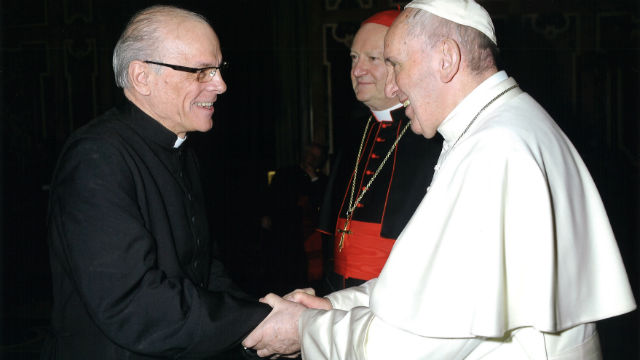Music and the Church

International
Archbishop Christian Lépine invited Father Robert J. Gendreau, Director of the diocesan Pastoral Liturgy Service, to participate in the International Conference on Sacred Music held at the Vatican, March 2-4.
This conference, both interdisciplinary and ecumenical, organized by the Pontifical Council for Culture and its President, Cardinal Gianfranco Ravasi, and by the Congregation for Catholic Education, in collaboration with the Pontifical Institute of Sacred Music and the Pontifical Atheneum of St. Anselm, brought together about twenty speakers and more than 350 participants from around one hundred countries. Among the speakers were Most Reverend Paul-André Durocher, Archbishop of Gatineau, and Montreal musicologist Paul Cardin.
Taking advantage of the jubilee of the publication of the Instruction Musicam Sacram following the Second Vatican Council, this conference sought to stimulate reflection on the liturgical, theological and phenomenological dimensions in the study of the current relationship between sacred music and contemporary culture, the Christian community's musical repertoire and musical trends.
Participants were able to explore in multiple ways and in different cultures the place of art in the proclamation and celebration of the faith. They were also invited to attend Vespers in the Sistine Chapel and to listen to a sublime performance by the Sistine Chapel Choir. Everyone was then received by Pope Francis in a private audience in the Clementine Hall.
Concluding this event, the Pope wished to remind everyone that "[i]t is therefore firstly a matter of intense participation in the Mystery of God, in the "theophany" that occurs in each Eucharistic celebration, in which the Lord manifests himself in the midst of his people, called to participate in a true way in the salvation enacted by Christ's death and Resurrection." The Pope pointed out that, on the one hand, "it calls for safeguarding and enhancing the rich and manifold patrimony inherited from the past, balancing it with the present and avoiding the risk of a nostalgic or "archaeological" outlook. On the other hand, it is necessary to ensure that sacred music and liturgical chant be fully "inculturated" in the artistic and musical language of the current time; namely, that they are able to incarnate and translate the Word of God into song, sound and harmony capable of making the hearts of our contemporaries resonate, also creating an appropriate emotional climate which disposes people to faith and stirs openness and full participation in the mystery being celebrated."
The Pope emphasized that "to foster this development, an appropriate musical formation must be promoted, even of those who are preparing to become priests, in a dialogue with the musical trends of our time, with the inclusion of different cultural areas and with an ecumenical approach." The Pope concluded by asking the Virgin Mary to accompany everyone so that no one loses view of "this important objective: to help the People of God to perceive and participate, with all the senses, physical and spiritual, in God's mystery."

Comment
0 Comment
Add new comment